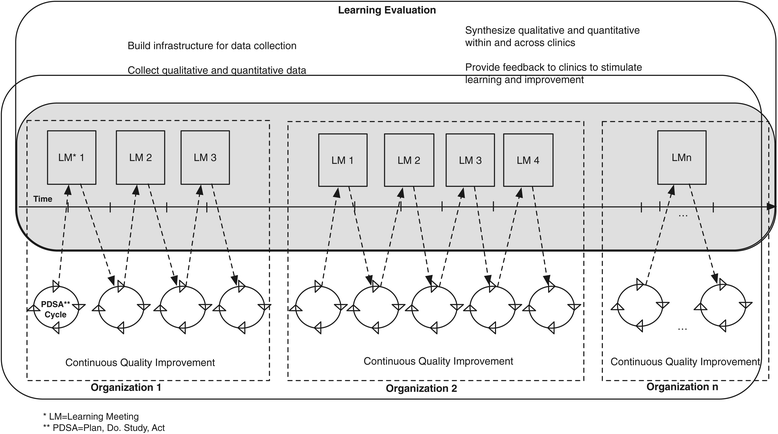Learning Evaluation: blending quality improvement and implementation research methods to study healthcare innovations
- PMID: 25889831
- PMCID: PMC4357215
- DOI: 10.1186/s13012-015-0219-z
Learning Evaluation: blending quality improvement and implementation research methods to study healthcare innovations
Abstract
Background: In healthcare change interventions, on-the-ground learning about the implementation process is often lost because of a primary focus on outcome improvements. This paper describes the Learning Evaluation, a methodological approach that blends quality improvement and implementation research methods to study healthcare innovations.
Methods: Learning Evaluation is an approach to multi-organization assessment. Qualitative and quantitative data are collected to conduct real-time assessment of implementation processes while also assessing changes in context, facilitating quality improvement using run charts and audit and feedback, and generating transportable lessons. Five principles are the foundation of this approach: (1) gather data to describe changes made by healthcare organizations and how changes are implemented; (2) collect process and outcome data relevant to healthcare organizations and to the research team; (3) assess multi-level contextual factors that affect implementation, process, outcome, and transportability; (4) assist healthcare organizations in using data for continuous quality improvement; and (5) operationalize common measurement strategies to generate transportable results.
Results: Learning Evaluation principles are applied across organizations by the following: (1) establishing a detailed understanding of the baseline implementation plan; (2) identifying target populations and tracking relevant process measures; (3) collecting and analyzing real-time quantitative and qualitative data on important contextual factors; (4) synthesizing data and emerging findings and sharing with stakeholders on an ongoing basis; and (5) harmonizing and fostering learning from process and outcome data. Application to a multi-site program focused on primary care and behavioral health integration shows the feasibility and utility of Learning Evaluation for generating real-time insights into evolving implementation processes.
Conclusions: Learning Evaluation generates systematic and rigorous cross-organizational findings about implementing healthcare innovations while also enhancing organizational capacity and accelerating translation of findings by facilitating continuous learning within individual sites. Researchers evaluating change initiatives and healthcare organizations implementing improvement initiatives may benefit from a Learning Evaluation approach.
References
-
- Institute of Medicine (IOM) Crossing the quality chasm: a new health system for the 21st century. Washington, D.C: National Academy Press; 2001. - PubMed
-
- Joint principles of the patient-centered medical home [http://www.pcpcc.net] - PubMed
Publication types
MeSH terms
LinkOut - more resources
Full Text Sources
Other Literature Sources


